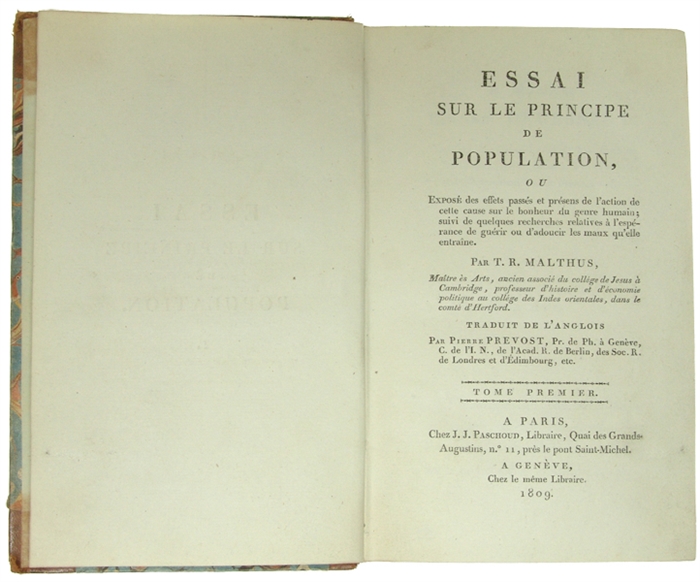ESTABLISHING DEMOGRAPHY
MALTHUS, T.R.
Essai sur le principe de population, ou Exposé des effets passés at présens de l'action de cette cause sur le bonheur du genre humain; suivi de quelques recherches relatives à l'espérance de guérir ou d'adoucir les maux qu'elle entraîne. Traduit de l'Anglois Par Pierre Prevost. 3 Tomes.
Paris & Genève, Chez J.J. Paschoud, 1809. 8vo. Bound in three nice uniform cont. hcalfbdgs. w. gilt backs, red leather title-labels w. gilt lettering and gilt round green tome-labels on backs. Capitals w. a bit of wear. Internally nice and clean. W. half-titles in all three volumes and advertisement-leaf in vol. one. XIII, (1), 424, (5); (6), 395, (1); (4), 392 pp.
First French edition of this political and economic classic, which constitutes Malthus' first major publication and his main work, because of which he is considered the father of demography and the main source of inspiration of Darwin and Wallace.
The first edition was printed anonymously in London in 1798, and in 1803 the second edition, which also according to Malthus himself can be said to constitute a new work, appeared; -the great quarto edition from 1803 is thoroughly revised and much enlarged, the title has been changed and Malthus' name appears on the title-page, it is on this edition that all the preceding editions are based, and in consequence also the early translations. All the later editions were minor revisions of the second one. In 1807 the fourth edition appeared, and in 1809 the first French one, which is translated from the revised fourth edition ("A la suite de cette préface on trouve dans la 4.e édition, sur laquelle je traduis, une notice de tous les changements que la 3.e édition a apportés à la 2.e. Le plus considérable est celui qui a rapport à l'estimation de la fécondité des mariages. Il est absolument inutile pour les lecteurs francois de connoître le détail minutieux des autres changemens, qui ne peuvent intéresser que les acquéreurs des précédentes éditions. P.P.p", Préface, p. xxiij). New revisions of the text kept appearing till the sixth edition in 1826.
The book, then as now, is considered highly controversial, and it has influenced all demographers ever since, as well as being of immense importance to the study of economic theory and genetic inheritance. "The "Essay" was highly influential in the progress of thought in the early nineteenth-century Europe.... "Parson" Malthus, as Cobbett dubbed him, was for many, a monster and his views were often grossly misinterpreted.... But his influence on social policy, whether for good or evil, was considerable. The Malthusian theory of population came at the right time to harden the existing feeling against the Poor Laws and Malthus was a leading spirit behind the Poor Law Amendment Act of 1834." (PMM 251).
Thomas Robert Malthus (1766-1834), called the "enfant terrible" of the economists, was an English demographer, statistician and political economist, who is best known for his groundbreaking views on population growth, presented in his "Essays on the Principle of Population", which is based on his own prediction that population would outrun food supply, causing poverty and starvation. Among other things this caused the legislation, which lowered the population of the poor in England. Malthus actually turned political, economic and social thought upside down with this work, which has caused him to be considered one of the 100 most influential persons in history (Hart, The 100: A Ranking of the most Influential Persons in History, 1978). Of course, he was condemned by Marx and Engels, and opposed by the socialists universally, but the work was of immense impact on not only politics, economics, social sciences etc, but also on natural sciences. "Later in the "Origin of Species" he [Darwin] wrote that the struggle for existence "is the doctrine of Malthus applied with manifold force to the whole animal and vegetable kingdoms; for in this case there can be no artificial increase of food, and no prudential restraint from marriage" [p. 63]. Alfred Russel Wallace, who arrived at a worked-out formulation of the theory of evolution at almost precisely the same time as Darwin, acknowledged that "perhaps the most important book I read was Malthus's "Principles of Population" (My Life, p. 232). Although there were four decennial censuses before Malthus' death, he did not himself analyze the data, although he did influence Lambert Quetelet and Pierre Verhulst, who made precise statistical studies on growth of populations in developed countries and showed how the early exponential growth changed to an S curve." (DSB, IX, p. 69).
As Malthus realized that his theories were not satisfactorily presented or sufficiently demonstrated in the first edition from 1798, he travelled for three years through Europe gleaning statistics, and then published the second edition in 1803. Among other places he travelled through France and Switzerland in 1802, and his detailed diaries of these journeys provided him with some of the evidence necessary for the development of his theory on population growth. The observational information that he gathered on his travels in Europe were crucial to the development of his theories, which also means that the work is of great interest for other European countries, and not only Britain. "In 1819 the Royal Society elected Malthus to a fellowship. He was also a member of the French Institute and the Berlin Academy, and a founding member of the Statistical Society (1834)." (DSB, IX, p. 67). Printing and the Mind of Man 251
Order-nr.: 31327


